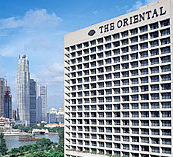 |
 |
 |
 |

|
|
|
|
| |

|
| |
| Rajesh Jhingon, from island life to building site |
| 22nd Dec 2004 |
| Back |
| |
 “I’ll be the one covered in dust,” jokes the well bred voice on the other end of the line, “seeing as I’m spending my days on a building site.” I’m due to meet up with the new GM of the renovating Mandarin Singapore, and on the strength of this first conversation I’m expecting an amusing chat punctuated with sneezes. “I’ll be the one covered in dust,” jokes the well bred voice on the other end of the line, “seeing as I’m spending my days on a building site.” I’m due to meet up with the new GM of the renovating Mandarin Singapore, and on the strength of this first conversation I’m expecting an amusing chat punctuated with sneezes.
Charming, entertaining, handsome, the Indian George Clooney of the hospitality world, Rajesh Jhingon was born to run luxury hotels. The only dusty element about him is his salt and pepper hair, which just adds to his seductive roomside manner. Combined with his impeccable experience in magnificent properties and, camouflaged under all of this, at least as far as his guests are concerned, a head plenty hard enough to rocket the operations and business aspects, he is the GM of the moment.
Recently flying from the leisure sector and paradise islands the Maldives and Mauritius, he has landed the most challenging job in Singapore, revamping the Mandarin Oriental. “It was an exciting offer,” he says, his eyes twinkling. “Repositioning a hotel, extensive renovation, a top notch company, top notch city, international business hotel – it’s the left half of my portfolio. I’ve done leisure.”
Up till now his career reads like a tropical holiday – opening Armi Villas Agra, opening GM of the Taj Exotica Maldives, pre-opening GM of the Taj Exotica Mauritius - it is hard not to envy his sun-drenched career even while you know he has hardly been sunbathing his time away. Just how has he managed to score those locations other inner city GMs only dream of?
“I’ve always been in hospitality,” he says. “I’m one of those diehards. And I’m better suited to think, adapt and embrace the top end more luxury hotel. My upbringing was full of travel, and my first job was with the Oberoi Group - a very luxurious brand. Those formative and impressionable years made me see the difference between operating a hotel and a luxurious hotel. All my inspiration and learnings and dos and don’ts came from there.”
As a student in Paris he learnt about the world, before buckling down to the beginning of a serious career. “An overseas education is 20% academic, 80% the spreading of horizons, travel, culture…” he reminisces.
Fast forward to today and he seems the ultimate choice in hotel openings. “I’m not a specialist but I have the experience," he says. “Having done it, every hotel is so different, every opening has its own set of challenges. In the Maldives it was logistics, it’s an island in the middle of nowhere. It was a very high profile destination, very high spending, very lifestyle. Your priority there is to make sure your operations philosophy is different from your neighbour.
“There are two or three main things: First of all clarity of purpose. People need to know exactly who you are. In the Maldives there were no kids; it was a very luxury retreat. Never any shades of grey. So it appealed to people you wanted it to appeal to. Secondly, the staff and service. Thirdly, detail: what differentiates me from the others?”
His most recent change of location sees him go from a 60 all-suite hotel to a 500 room property with a strong business element. Although leisure and business hotels share some elements Rajesh points but there are many differences, and value for money is one of them. “After a point in time money isn't important in the high end luxury leisure sector. Those clients look for value for money in a different way. Their time is precious and they want a week in a hotel. The things they seek are tranquility – doing nothing.
“In a city hotel in particular there are a couple of drivers for positioning. One is technology in the guest room. It is a case of business from the room and entertainment. Secondly is service. Hotels are not churning out numbers, or institutionalizing guests. They need to retain guests and get new people and it is the one on one relationships that make that happen.”
Rajesh, naturally, is the king of guest relations. “In the Maldives and Mauritius I had a lot of contact with high-end press, journalists and photographers, and celebrities. It is a matter of giving them what they want and expect. You can’t bullshit them. This is reflected in 15-20% repeat clientele.”
|
|
 With high hopes for the Mandarin on the strength of his past, I wondered just how he was acclimatizing to living in a major Asian city. With high hopes for the Mandarin on the strength of his past, I wondered just how he was acclimatizing to living in a major Asian city.
“First of all I love Singapore. My family loves it, the schooling is great. It is safe, clean and everything works. Plus there is a good mix of nationalities. It is a great foothold into Asia – Hong Kong, KL...
“2005 is going to be the year when all the hotels are going to try to up their rates. It is high time Singapore got better rates for what it offers. Same hotels in other cities get 30-40% more earnings. Average room rates here don’t reflect the prowess and services of the hotel. Singapore is going to see the rack rate go up 10-12%, maybe 15, because it is an expensive destination. Running manpower and utilities is not cheap. You need x amount for training, x for systems for safety, staff, back of office, x amount of facilities for customers. It all adds up to a fixed cost and if you don’t get your returns… For instance F&B - does it make money? Meetings and banqueting, yes. We are competing with stand alones and hawker centres. People here eat out but they don’t go to a 5 star because its not once a week, it’s every day. But they come here and people expect the best.”
Looking at the leisure side of things, and naturally the spa, Rajesh says, “the Mandarin is an Asian company, so we’ve got the right credentials and resources. Concepts of eastern philosophy and design with western aspects. It all comes well together. The urban landscape of Singapore, it is a cocoon, inward looking, but brings out the nuances of tranquility that is a spa. Spa is a necessity now, like a pool.
And just where does a GM that’s worked in the most paradisiacal islands of the world go to chill out? “Hoteliers are a strange breed,” he chuckles. “They look under plates, check out the set up with one eye. So we seek holidays which are very residential - away form people. Hideaways where you are pampered with good food, a place to relax, chill out, no talking about work. It is hard to impress us”, he finishes, setting down a challenge with a smile.
|
| | | |
|
|
| |
|
|
|
|
| |
|
|
|
|
|
 |
 |
 |
 |
|


